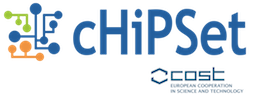|
Name |
Mauro Iacono |
|
Affiliation |
Universitŕ degli Studi della Campania “Luigi Vanvitelli” (formerly known as Seconda Universitŕ degli Studi di Napoli), Caserta, Italy |
|
Corresponding WG |
Working group 1 |
|
Grant research topic |
Models for advanced Big Data platforms |
|
Hosting Institution |
University Politehnica of Bucharest, Romania, Bucharest, Romania |
|
Period |
15/1/2017 to 16/2/2017 |
|
Summary of the scientific report |
The topics on which the WG1 group of the IC1406 COST Action (Enabling Infrastructures and middleware for Big-Data Modelling and Simulation) focuses include the research on the development of novel heterogeneous models, algorithms and techniques for advanced Big Data exploitation, based on the current and emerging multicore system architectures, virtualized servers and datacenters, mobile cloud and multi-cloud systems. An important contribution is given by performance evaluation and performance engineering techniques and methods, that support the management and design of complex HW/SW systems. The aim of the visit during STSM is to exchange expertise on performance evaluation methods and techniques used in the two groups and to compare the approaches. The two groups have an extended literature in the field, and apply their approaches to different goals within high performance computing systems: the guest’s group characterizes big scale architectures as a whole, from the point of view of the administrator or the provider, using stochastic approaches to describe the overall workload and the behavior of the system, while the hosting group focuses the analysis on the software applications, with reference to software architecture and middleware. The final goal is to establish an extended, stable collaboration to integrate the results and the techniques of both parties to develop a unified comprehensive approach that should exploit the advantages of the two points of view. The horizon of the future research activities, for which a specific agreement has been signed, includes multi-Cloud or hybrid cloud architectures and a special attention to the energy related issues, while the immediate plans are about the characterization of microservices based software systems. The workplan is organized into 3 main activities, here articulated in tasks in the following: 1. definition of the background for the collaboration a. presentation of research activities b. presentation of previous research results c. state of the art for the collaboration 2. development of common research activities a. analysis of possible common research goals b. definition of immediate contributions c. hands-on work on immediate contributions d. definition of the long-term collaborative research activities 3. planning of long term collaborative research activities a. discussion on the goals b. discussion of the techniques c. general tentative planning and timelineThe activities have been organized on a weekly basis. The first week has been devoted on reciprocal presentation and critical analysis of the relevant activities of the two groups: the main topics from the guest’s group have been the presentation of the fundamentals, the application and the main results of multi-formalism modeling techniques, while the hosting group presented several ongoing research activities and projects, with special attention to the open projects. The main results of the activities of the week have been the analysis of literature related to the field and the identification of possible contributions. The second week has been devoted to analyzing and simulate a case study, provided by the host institution, to experiment and hands-on interaction. During the third week, the work done during the second week has been discussed and analyzed, and the results have been pun in form of a draft paper, that has been submitted for publication to the International Journal of Parallel Programming. At the same time, there has been a fruitful planning about further research opportunities based on similar activities on more complex software architectures, namely microservices based applications, also in collaboration with another COST action. The results of the visit can be summarized into a state of the art, a research plan and a possible simulation testbeds to support future activities. The results of immediate activities will be published by means of research papers targeting: – International Journal of Parallel Programming (accepted for publication): “Adapting MCP and HLFET algorithms to multiple simultaneous scheduling”, Emilia Ioana Popa, Mauro Iacono, Florin Pop; – Future Generation Computer Systems; – another Q1 or Q2 suitable journal; – a special issue on microservices architectures. Additionally, we proposed a Special Issue of the Journal of Parallel and Distributed Computing (Elsevier) on High-Performance Computing in Edge Computing Networks, accepted by the journal. Finally, the basis has been set, in terms of possible publications, contributions to the Action and more strategical activities, starting from the formal setup of a permanent long term collaboration between the two groups on Microservice Based Architectures. |
|
Personal notes |
